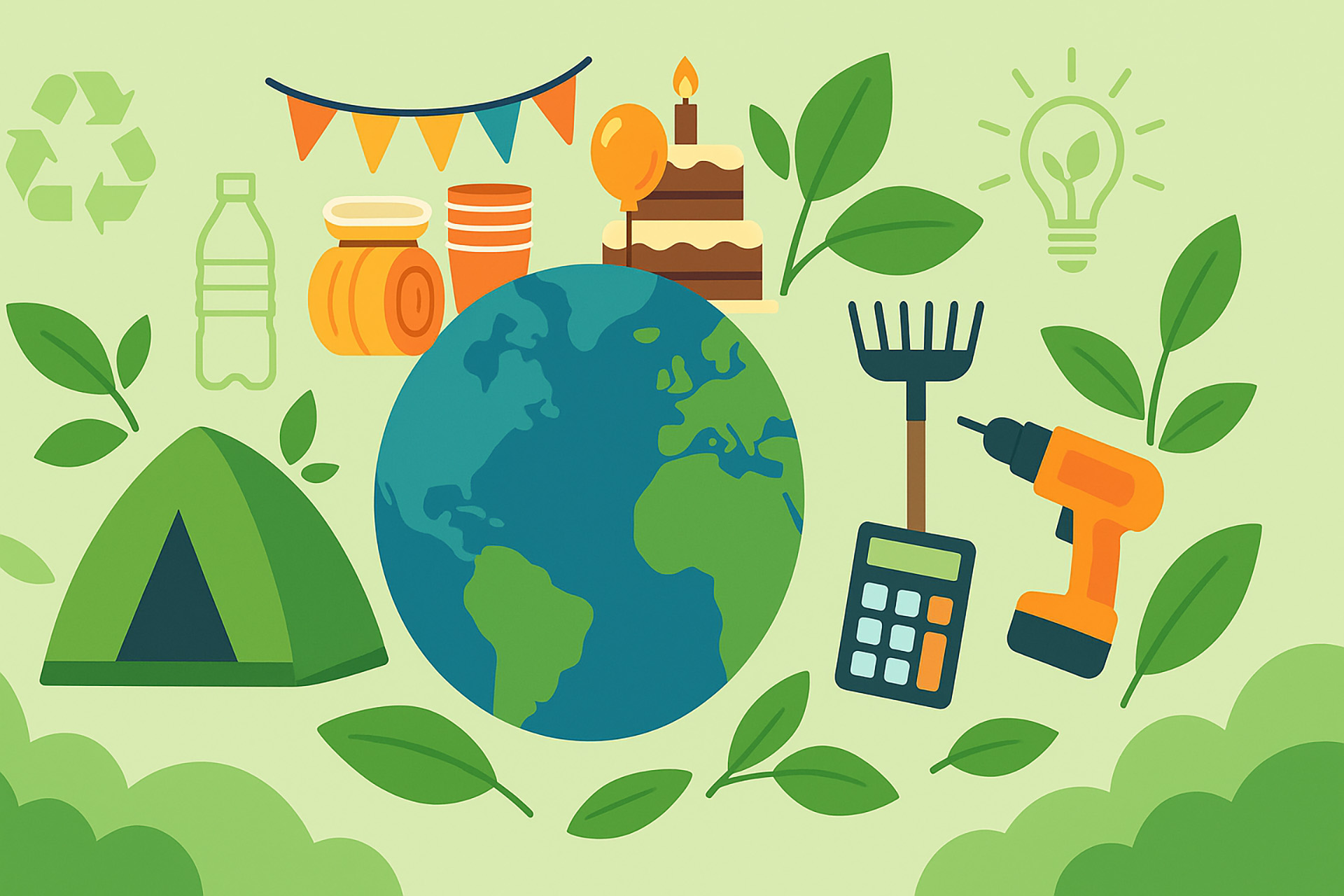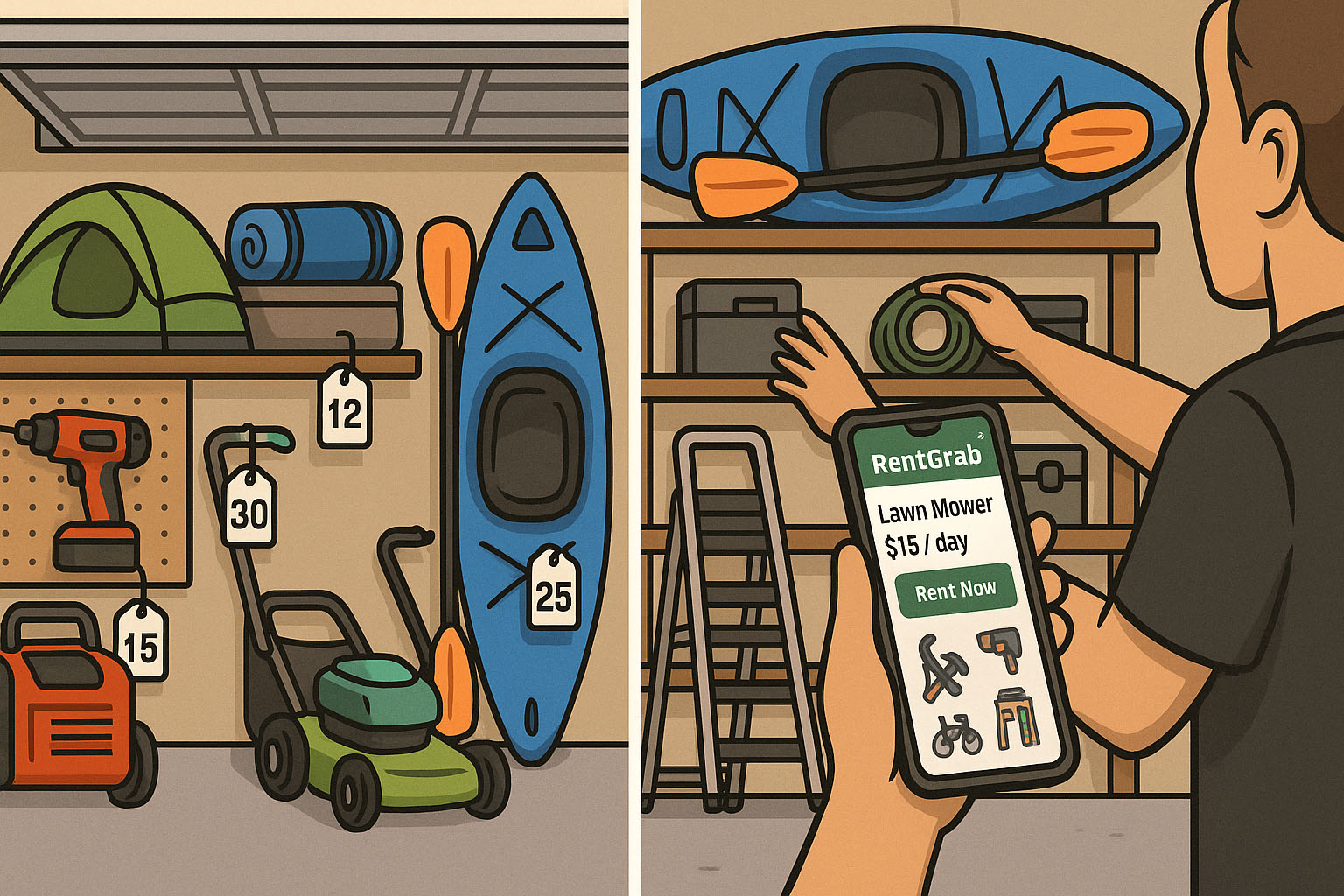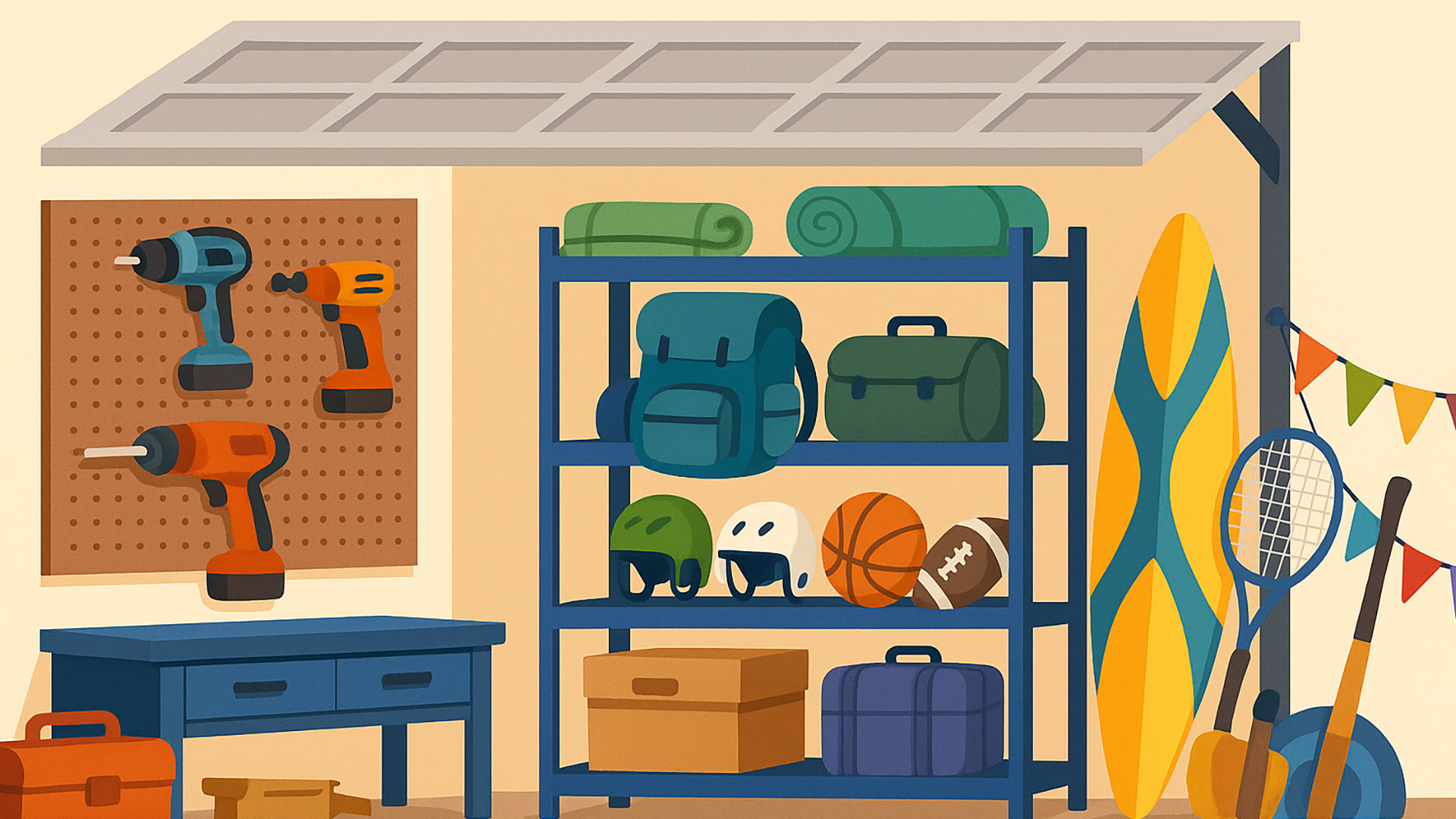
How the Sharing Economy Saves Money AND the Planet
Every year, Americans buy 65 billion dollars worth of items they’ll use less than 10 times. That’s not just a financial problem – it’s an environmental crisis hiding in plain sight. But there’s a solution that’s both profitable and planet-friendly: the sharing economy.
The Hidden Environmental Cost of Ownership
When you buy a power drill, you’re not just buying the drill. You’re buying:
- Raw materials mined from the earth
- Manufacturing emissions from production
- Packaging waste that often isn’t recyclable
- Transportation emissions from global shipping
- Eventually, landfill space when it’s discarded
Studies show that manufacturing a single power tool produces approximately 40 pounds of CO2. Multiply that by the millions of drills sitting unused in garages, and you start to see the problem.
The Numbers Don’t Lie
Let’s look at the environmental impact of common household items:
Manufacturing Impact
- Lawnmower: 88 lbs of CO2 + 2.2 lbs of plastic waste
- Pressure Washer: 55 lbs of CO2 + 1.8 lbs of packaging
- Camping Tent: 31 lbs of CO2 + synthetic materials that take 40 years to decompose
- Power Drill: 40 lbs of CO2 + rare earth metals
The Multiplication Problem
If 10 neighbors each buy a pressure washer they use twice a year:
- 550 lbs of CO2 produced
- 18 lbs of plastic waste created
- 10 units manufactured when 1-2 would suffice
- $3,000 spent collectively
If those same neighbors shared 2 pressure washers:
- 110 lbs of CO2 (80% reduction)
- 3.6 lbs of plastic waste (80% reduction)
- $600 spent (80% savings)
- Everyone still gets their driveways clean
Beyond Carbon: The Resource Crisis
It’s not just about CO2. Consider:
Water Consumption
Manufacturing consumer goods requires massive amounts of water. A single ladder requires 150 gallons of water to produce. Sharing existing ladders instead of everyone buying their own could save millions of gallons annually.
Rare Earth Metals
Your unused electronics contain precious metals mined at enormous environmental cost. That drone gathering dust? It contains lithium, cobalt, and rare earth elements that required moving literally tons of earth to extract.
Landfill Space
Americans throw away 12 million tons of furniture and furnishings annually. Much of this could have been shared, repaired, or kept in circulation through peer-to-peer rental platforms.
The Sharing Economy Solution
Peer-to-peer rental platforms are creating a new model of consumption that’s both economically and environmentally sustainable:
Maximize Utility
Instead of 10 drills used 0.1% of the time, have 2 drills used 5% of the time. Same access, 80% less waste.
Extend Lifespan
Shared items are maintained better because they generate income. A well-maintained tool can last 20 years instead of rusting in a garage.
Reduce Demand
Every rental is potentially one less purchase, one less manufacturing cycle, one less item headed to the landfill.
Environmental Impact Potential
Cities embracing the sharing economy could see significant environmental benefits. The potential for peer-to-peer sharing to reduce consumption and waste is substantial when communities fully adopt these practices.
The Circular Economy in Action
The sharing economy is a perfect example of circular economy principles:
- Design out waste – Share instead of duplicate
- Keep products in use – Rentals extend product lifespan
- Regenerate systems – Build community while reducing consumption
How Sharing Creates Circles
Traditional Linear Economy: Extract → Produce → Use → Dispose
Sharing Circular Economy: Produce Once → Share Many → Maintain → Share More → Repair → Share Again
The Community Impact
Environmental benefits are just the beginning. The sharing economy also:
Builds Social Capital
Sharing creates connections. Studies show that neighborhoods with active sharing networks report:
- 34% higher community satisfaction
- 28% more social interactions
- 41% stronger sense of belonging
Promotes Conscious Consumption
When you can easily rent, you think twice about buying. Users of sharing platforms report:
- More thoughtful purchase decisions
- Reduced impulse buying
- Greater awareness of consumption habits
Creates Resilience
Communities that share are more resilient. During the pandemic, neighborhoods with sharing networks adapted faster, helping each other with tools, equipment, and resources.
Your Carbon Savings Calculator
Here’s what you save by renting instead of buying:
Pressure Washer (used 2x/year)
- Renting saves: 55 lbs CO2
- Equivalent to: Driving 63 miles
Camping Gear Set (used 1x/year)
- Renting saves: 124 lbs CO2
- Equivalent to: 6 trees planted
Power Tool Set (occasional use)
- Renting saves: 200 lbs CO2
- Equivalent to: 230 miles not driven
Party Supplies (few times/year)
- Renting saves: 75 lbs CO2
- Equivalent to: 3.5 trees planted
The Ripple Effect
When you choose to share:
- You save money (typically 50-70% vs buying)
- You prevent waste (one less item manufactured)
- You influence others (normalizing sharing behavior)
- You build community (creating local connections)
- You vote with your wallet (supporting sustainable business)
Overcoming the Ownership Mindset
We’ve been conditioned to believe ownership equals success, but ask yourself:
- Do you need to own a tile saw, or do you need tiles cut?
- Do you need to own a kayak, or do you want to kayak sometimes?
- Do you need to own everything, or do you need access when necessary?
The sharing economy offers us access without the burden of ownership, savings without sacrifice, and community without compromise.
Start Your Sustainable Journey
Every item you share instead of buy is a small victory for the planet. But small victories add up:
- If 10% of Americans shared tools instead of buying: 2 million tons of CO2 saved annually
- If every neighborhood had a sharing network: 15% reduction in durable goods production
- If sharing became the norm: Fundamental shift in how we consume
The Choice is Yours
We stand at a crossroads. We can continue the cycle of buy-use-store-discard, filling our homes with unused items and our planet with waste. Or we can embrace a new model – one where access trumps ownership, where community trumps consumption, where sharing creates abundance rather than scarcity.
The sharing economy isn’t just about saving money or making money. It’s about recognizing that the earth’s resources are finite, but our ability to share them is infinite.
Ready to be part of the solution? Join the sharing economy movement. Save money, make money, and save the planet – one rental at a time. Because the greenest product is the one that already exists.
Get the latest rental insights
Subscribe to our newsletter for equipment rental tips, industry news, and exclusive offers.
Join the waitlist and get:
- ✓ 3 months free premium features ($147 value)
- ✓ Founding member badge
- ✓ First access when we launch
- ✓ Insider tips and early bird specials
We respect your privacy. Unsubscribe at any time.
Related Articles

How the Sharing Economy Saves Money AND the Planet
Discover how peer-to-peer rentals reduce waste and carbon emissions while building sustainable communities and saving you money.

What RentGrab Actually Is (And Why It Matters)
RentGrab is a neighborhood marketplace where you rent what you need and earn from what you own. Here's exactly how it works.

The $3,000 Problem Hiding in Your Garage
Discover how much value is sitting unused in your home and how the sharing economy can turn your idle items into a profitable side income stream.
